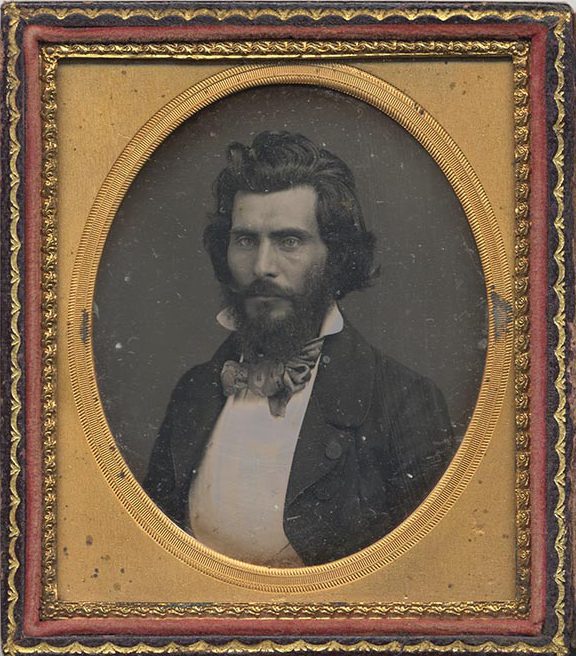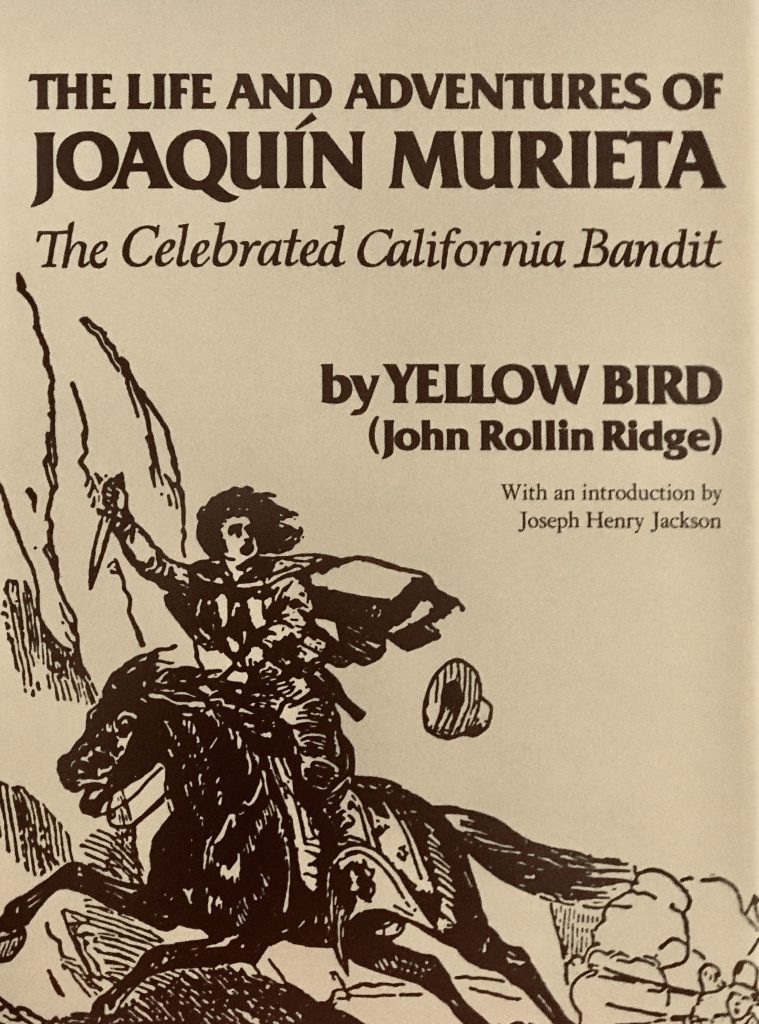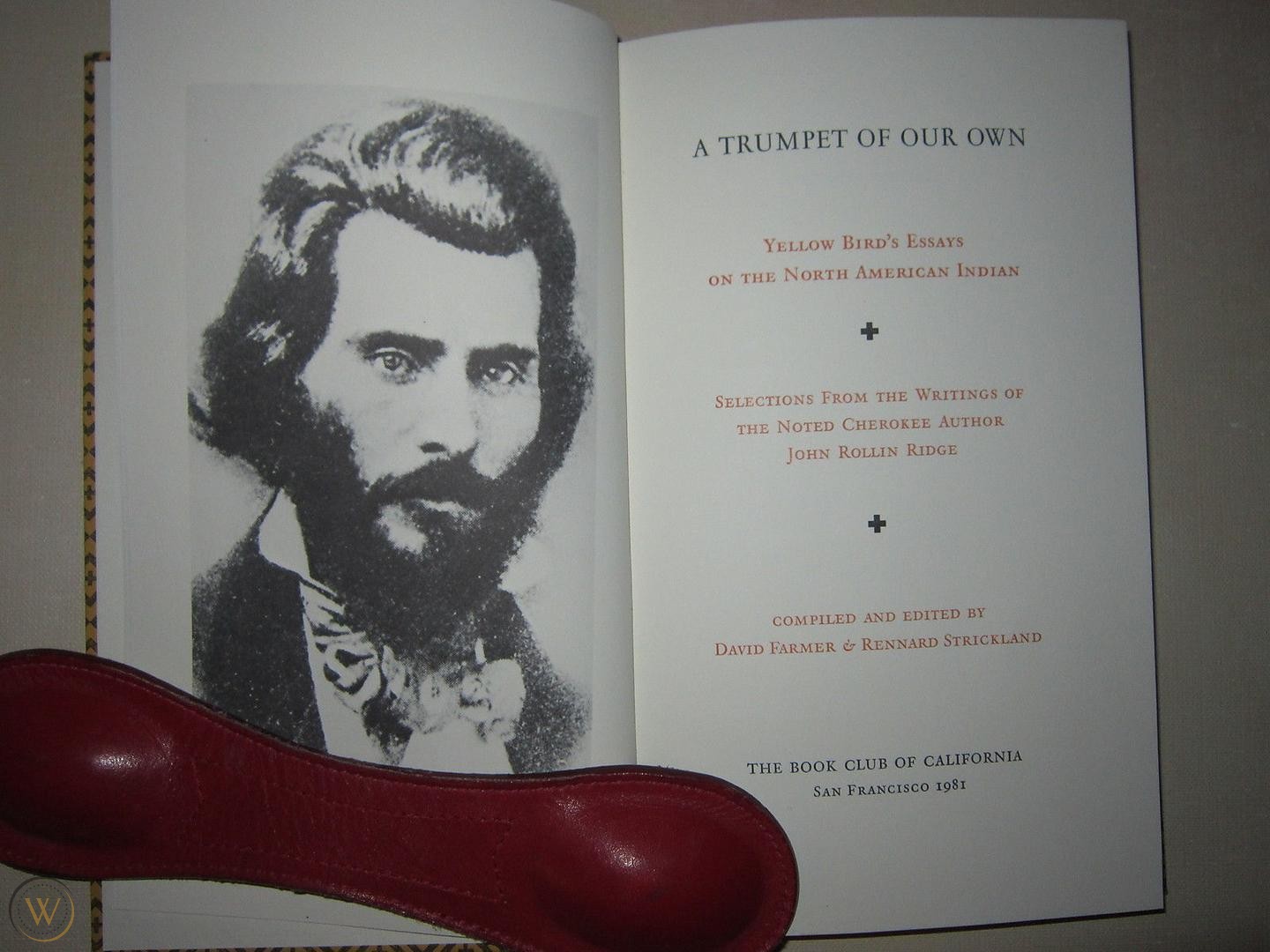John Rollin Ridge’s Cherokee name is Cheesquatalawny or “Yellow Bird.” He is considered the first Native American novelist.

John is born in 1827 in New Echota, the Cherokee Nation’s capital in Georgia. When John’s father is killed by political rivals, his mother takes the Ridge family west in the 1830s, just ahead of the forced migration of the Cherokee that is the Trail of Tears.
The Ridge family relocates to Missouri. From 1843 to 1845, Ridge studies Latin, Greek and classical literature at Great Barrington Academy in Massachusetts, writing his first poem “To a Thundercloud.”
While living in Missouri, Ridge kills a man he believes assassinated his father. To avoid prosecution, he flees to California during the Gold Rush.
Ridge doesn’t take to prospecting and turns his hand to writing. He is a correspondent for the New Orleans newspaper True Delta and later serves as editor of several California newspapers, including the Daily Bee in Sacramento and the Express in Marysville.

Ridge is best known for his book, The Life and Adventures of Joaquin Murieta, the Celebrated California Bandit — the first novel written in the State of California.
Joaquin Murieta is a notorious outlaw killed in 1853. In his 1854 fictionalization, Ridge portrays Murieta as a innocent Mexican immigrant who seeks success in the gold fields but turns to crime in anger and desperation after being thwarted by the Foreign Miner’s Tax and seeing his wife raped and his brother killed by white men.
Although a “bestseller,” the book provides no income to Ridge during his lifetime. His wife posthumously publishes a book of his poetry that includes an ode to Mt. Shasta, “A Cherokee Love Song” and this paean to California:
BRIGHT land of summery days and golden peace,
Of vine anti flower and ever rich increase;
Of veined hills and mountains treasure-stoned,
Where miser-gnomes in secret watch their hoard,
And startle at the burglar pick and spade,
Where, winding through the arid plains and drear
That freshen with the liquid presence near,
Or circling round the pine-clad mountain’s side,
With crystal music in its rippling tide,
Or rolling, joyous in its volumed flow,
O’er yawning gulf and deep abyss below,
The sinuous flume far bears its precious stream,
And thousand hearts are gladdened in its gleam!
Nor less where, swift upon his path of fire,
The modern Mercury treads th’ electric wire–
The living chord that vibrates through the hills,
Groans in the storms or in the breezes thrills;
Threads plain and wilderness, and pierces far
To homes that nestle where the glaciers are.
Nor less again have Art and Labor wrought
To realize the bold, inventive thought
That finds achievement in the tunneled hills.
The sunken shaft, the thunder of the mills;
The rivers leaping from their ancient bed
And plunging headlong in the course they’re led;
The mountains crumbling to the level plain,
And forests prostrate ‘neath the ax’s reign.And shall we view these miracles and more
Which mind and muscle never wrought before,
Without remembrance in these latter years,
Of those brave men, those hardy Pioneers,
Who led the way for Science, Art, and Law,
‘Mid dangers their successors never saw,
And countless hardships that they never knew?
The famed and unfamed heroes tried and true,
Who crowded into months or days the deeds
Of years, and of young empire sowed the seeds?
Amid the mass there here and there appears
Some reverend head, majestic as a seers–
Arising from the rest like snow-crowned peak,
Around whose brow’ the whitening tempests break!
These are the Pioneers of Pioneers,
Those elder heroes in the fight, who, years
And years agone, did drive the wild beast back
To plant their homes where late he left the track.
They ‘re sinking, one by one, like pines that long
Have braved, erect, the howling winters strong,
To fall at last midst stillest peace profound,
And wake the woods with wonder at the sound.
Shall these old heroes be forgot? Not so,
For, while they yet survive Time’s downward flow,
I see a rescuing hand stretched forth to save
The good, the true, from dark Oblivion’s grave.
‘Tis woman’s hand that thus would snatch from night
That do their careful-hidden wealth invade,
I would some better worthier hand than mine
Could yield thee now the tributes that are thine,
And paint thee, as a poet should, divine!
But, poor indeed would be the tongue, and weak,
Which could not something of thy glories speak.
And while for thee no gems of thought I bring
From starry paths of lonely wandering,
Where Genius wont to stray, yet may my muse
Have found such tribute as thou ‘lt not refuse–
Some humbler flowers of modest mien and hue
By silver stream~ in truth’s fair fields that grew.Than this the sun lights up no lovelier land,
So wondrous rich and beautiful and grand!
From where Old Ocean ‘gainst the rock-bound shore
His billows roll with never-ceasing roar
To where the far-off ghostly snow-realm shines,
Or solemn music of the mountain pines
Sounds through those dim and haunted solitudes,
As if the thunder whispered to the woods;
Or where the golden-sanded streams do stray
And freshen Nature in their gladdening way;
Where’er our footsteps tend our visions roam,
We find but beauty’s Eden, grandeur’s home!
Yet not alone to Nature’s bounteous hand
Are due the glories of this magic land;
For man hath taught its fertile soil to yield
The yellow largess of the waving field,
And give to generous toil as rich guerdon
Of thousand fruits as toil bath ever won.
In deed and truth not idle bath he been–
His busy work is all around us seen.
From north to south, and from the cast to west,
His forming, changing hand bath not seen rest.
The Arts and Labor spake, and lo! there rose
(As dream-like as the cloud-born city shows,
At morning in the east) this grandest Queen
Of all the cities of the West. With mien
Majestic as of right her look should be,
She sits like Tyre of old beside the sea;
And, while the messengers of commerce wait,
She opens wide and free her Golden Gate.
From far to her the nations laden come
With silks and wares and precious stones and gum,
And of the spoils she every land beguiles
And ocean yields them from his thousand isles.Nor less the Genius of the Arts, with aid
Of Labor’s rugged toil, bath been displayed
Those honored names far worthier of the light,
And them transmit to shine on History’s scroll
When that gray sage his records shall unroll.
And yet some whom the weeping muse laments,
Have their unwrit but lasting monuments.
Such is that Peak which bears brave Lassen’s name–
A fit memorial of the grandest fame;
For it shall stand while crowns and laurels fail,
And Time strews men like leaves upon the gale.
Proud land, to give such honored men their graves!
Long as thy shore the broad Pacific laves
Or soars to heaven Mount Shasta’s brow of awe
(Like that “white throne” and vast th’ Evangel saw),
Shall thy most rare and golden name be crowned
With all that glory gives, the world around!
Still shall the nations visit thee from far,
(With Hesper deemed a not unequal star;)
Still shalt thou lavish, pour thy treasures forth,
Enriching all from thy exhaustless worth;
Still shall thy sons be brave, thy daughters fair,
And Art and Science breathe thy purer air.
